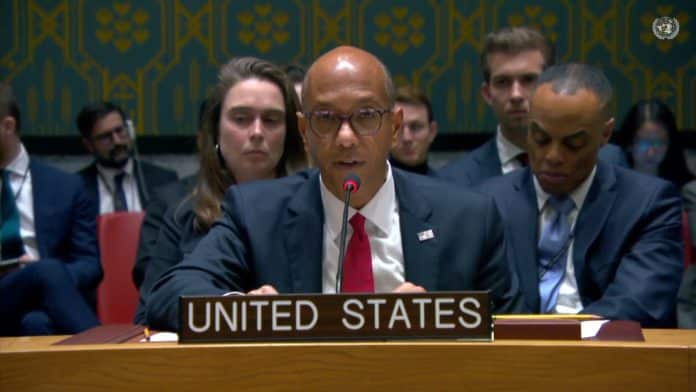The US has proposed a temporary ceasefire in Gaza as Israel prepares to expand its operations, but has once again vetoed the immediate ceasefire called for by other members of the United Nations Security Council.
As global support to end the war intensifies, the US voted against an Arab-backed UN resolution demanding an immediate humanitarian ceasefire in the conflict-wracked Gaza strip, where at least 29,000 Palestinians have been killed in Israel’s air and ground offensive.
Instead, the US has proposed an alternative resolution that suggests a temporary ceasefire “as soon as practicable”; calls for the lifting of all restrictions on the delivery of humanitarian aid; and requires the release of hostages taken by Hamas in the October 7 attack.
It has also warned against Israel’s planned offensive in Rafah, where more than a million Gazans are currently taking shelter after Israel designated it a safe zone.
“Under current circumstances a major ground offensive into Rafah would result in further harm to civilians and their further displacement including potentially into neighbouring countries, which would have serious implications for regional peace and security,” the draft US resolution says.
“Such a major ground offensive should not proceed under current circumstances.”
The vote in the 15-member Security Council was the third time the US has used its veto powers on the Security Council to block a draft resolution demanding an end to the war
In a sign of the increasingly isolated stance the US is taking, it was the only member nation country to do so, with the UK abstaining, resulting in a 13-1 vote.
Explaining the decision on Tuesday (Wednesday AEDT), the US ambassador to the UN, Linda Thomas-Greenfield, said proceeding with such a vote was “wishful and irresponsible,” as it could jeopardise sensitive negotiations to get hostages released – a position backed by the White House on Tuesday (Wednesday AEDT).
“I think most of the people around the world would love to see those hostages home with their families, and if we just voted and went along with this resolution, the chances of doing that would be greatly reduced,” spokesman John Kirby told reporters.
“So we’re comfortable with the approach that we’re taking.”
But the issue has become increasingly challenging president Joe Biden, who not only faces waning public support ahead of November’s election due to his stance, but now also faces an open revolt from Democrats ahead of this month’s Democratic primary race in Michigan – a critical swing state with high numbers of Arab-Americans.
This came to a head over the weekend, when Democratic congresswoman Rashida Tlaib, the only Palestinian-American elected to the US Congress, called for people to effectively vote against Biden in the February 27 contest.
“Right now, we feel completely neglected and just unseen by our government,” Tlaib said in a social media video as she stood outside an early voting centre in the state.
“If you want us to be louder, then come here and vote uncommitted.”
In the absence of a serious challenger, Biden is still expected to win the Michigan primary in a landslide, but the comments have nonetheless been seized on by Donald Trump’s campaign as a sign of the President’s woes within his own party and the electorate more broadly.
“It’s all falling apart for Joe Biden,” said Trump adviser Jason Miller.
But the White House insists it is doing what it can to pressure Israel to limit casualties as the war drags on.
Israeli Prime Minister Benjamin Netanyahu has said troops will move soon into the town of Rafah on the Egyptian border, where over half of Gaza’s 2.3 million people have sought refuge from fighting elsewhere.
Many of the Gazans in Rafah were previously displaced from northern parts of Gaza and are now facing the possibility of being displaced again. The US, meanwhile, is working with mediators Egypt and Qatar to try to broker another cease-fire and hostage release agreement.
Kirby said that while the US supported Israel going after Hamas, they did not appear to have a credible plan to reduce civilian harm.
“We do not support operations in Rafah under the current circumstances without a credible plan to deal with the safety and security of the people there,” he said.














